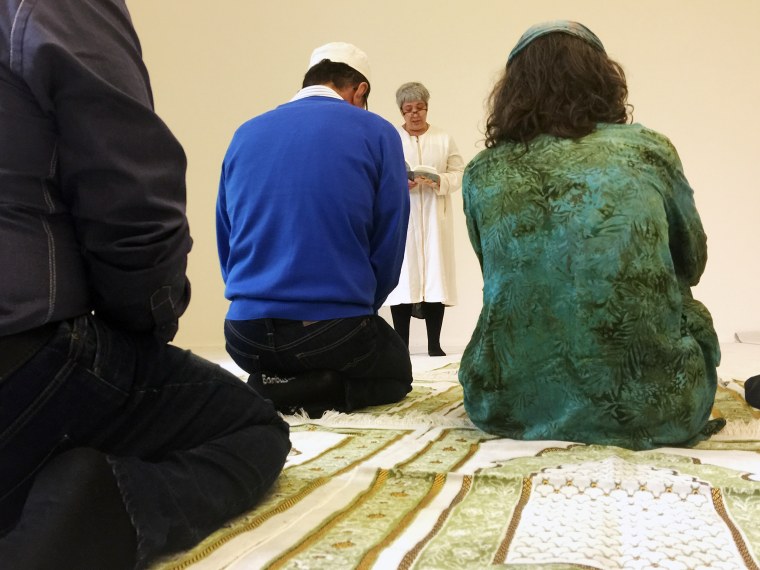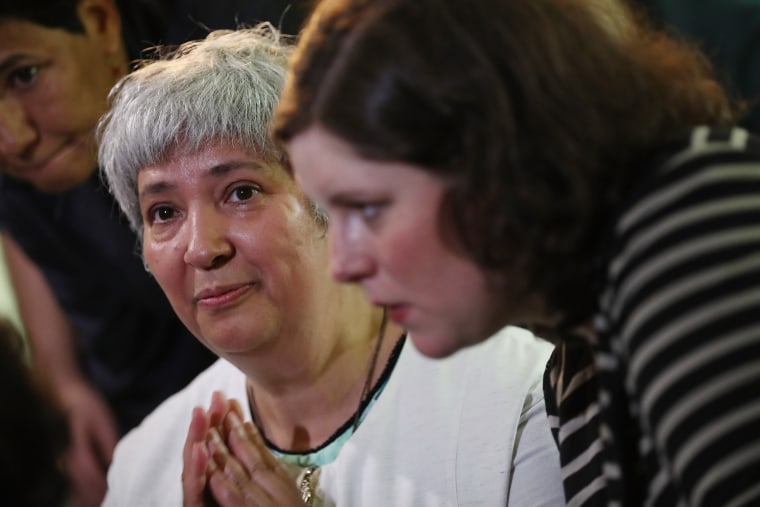BERLIN — When Seyran Ates welcomed half a dozen worshippers and twice as many journalists to Friday prayers at Germany’s first “liberal mosque” in Berlin, she warned that “for security reasons” no photos or video should be taken which could identify those praying.
“It is bad enough that I need to have police escort, we do not need to endanger others,” said the 54-year-old human rights lawyer, who receives 24-hour police protection due to numerous death threats.
Ates founded the Ibn-Rushd-Goethe mosque in the German capital as a “place for all those people who do not meet the rules and regulations of conservative Muslims,” she said.
The new Berlin mosque, whose name is an homage to two free-thinking philosophers, allows men and women to pray side-by-side and promotes itself as being open to gay and lesbian Muslims.
“It is very important that we do not have a dominance of men or women at our mosque,” Ates said, as she prepared to lead the prayer service in the small white-walled place of worship.
A Berlin Protestant church made its former theater available to house the mosque, which is open to all schools of Islam and allows women to pray without covering themselves with a hijab, burqa or niqab.

Nevertheless, during the Friday prayers visited by NBC News, 52-year-old Susanne, who did not want to give her last name for privacy reasons, lead the prayers wearing a black hijab.
“I am covering my head out of respect for God,” the German elementary school teacher said. “But I am coming here to support liberal values,” she added.
According to Ates, the idea for her "liberal mosque" was born in 2009 when she was a member of Germany’s Islam conference.
"Politicians at the time kept asking, 'Where are the liberal, where are the moderate Muslims that are living a modern Islam?'" Ates explained.
"That’s when I decided that we need to call into life a mosque where the Quran is also read in a critical historic context,” Ates added.
Turkey's government voiced strong criticism of the mosque after it was opened in June, and hardliners in Egypt even issued a fatwa, or Islamic religious ruling, against it.

Sheikh Atef Asker, of Egypt’s Al Azhar mosque and university — often referred to as the foremost Sunni institution worldwide — said that the Berlin mosque does not follow the true path of Islamic methodology.
“Allah, glory be to him, has ordered us to have the prayer led by a man and not a woman. It's not about being strict or not, it's about following an order,” Sheikh Asker told NBC News.
Meanwhile, Egypt’s Dar al-Ifta al-Masriyyah, a state-run Islamic institution assigned to issue religious edicts, also posted a statement on Facebook last month declaring that “it is not permissible to pray without a hijab and not permissible for a woman to lead a man in prayer” under the rules of Islam.
While only a few worshippers attended Friday prayers on the official “media day,” Ates said that the interest from liberal Muslims in her mosque has been “significant" and that it has welcomed 20 to 30 regular followers, including several recently arrived refugees.
“We also have refugees approach us, who say that many of the traditional mosques here are too conservative, too radical, too orthodox,” Ates said, referring to the recent influx of nearly a million refugees from Muslim countries such as Syria and Iraq into Germany.
She said that the mosque and the work of her group is sending a signal in the fight against Islamist terror.
Coincidentally, her institution is only a few blocks away from the fundamentalist mosque visited by Anis Amri, a Tunisian asylum seeker, who killed 12 people in an attack on a Berlin Christmas market last December.
To show that "Islam is peaceful" and that many Muslims are “open to change,” Mohammad Moshiri, an Iranian writer and poet, joined the Friday prayers.
"We should not surrender our religion to fundamentalists," said the 60-year-old Moshiri, who also works as an integration representative in Berlin. "Seyran Ates is very courageous, we need to support her."
The taboo-breaking mosque will stay open despite the death threats and strong criticism, Ates vowed. It is now cooperating with local schools and plans to offer Quran and Arabic language classes in the future.
“Our vision, our dream is to one day have our own building with rooms for Sunnis, Alawites, Shiites and Sufis, and one room where they then can all come together for religious encounters,” Ates said, naming four sects of Islam.
“But there should also be a place for inter-religious dialogue that would even invite people who do not believe in God,” she said.
